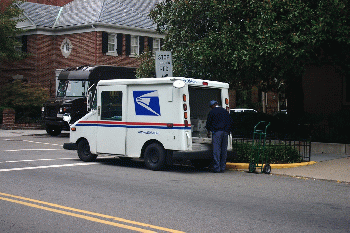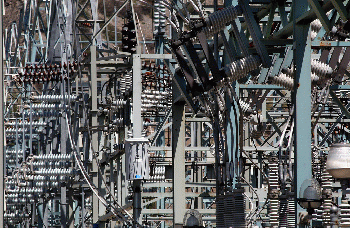Delivery of groceries and of meals, not to mention all of merchandise we order on the internet, are subject to extra charges and we value the convenience of delivery that we get in return. Usually we think of each such charges as reasonable compensation for a specific delivery. Likewise, our mail gets delivered to us and while there is a specific charge for that as well, it is a charge paid by the sender by purchasing a stamp. In the early days of USPS, the majority of expenses for delivery were picked up by the federal government in the form of subsidies; the inexpensive stamp mostly served as a reminder that we should appreciate our government for this great service.
But even quite early in this nation's history there were competitors to USPS such as the Pony Express that promised more rapid delivery. Later that company became Railway Express then REA Express and now UPS, but there are additional competitors, notably Federal Express. These competitors to USPS have no explicit government support and so they must depend largely if not entirely on shipping charges to support their operations. But for that matter, USPS must do the same since in the last few decades, USPS has lost all of its government support (though strangely while retaining special restrictions). Despite the added costs imposed by the government, it too must now largely rely on shipping charges for financing its operations. Those charges have naturally had to increase considerably so that USPS seems no longer such a great bargain.
We might wonder why taxpayers used to pay the bulk of costs for operating USPS. But no doubt some recall learning in grade school that it was in recognition of the great importance for citizens in a democratic republic to communicate with each other and especially for them to have easy access information about government and politics. Is this no longer something we need? If so, we should wonder about the reasons why government support for USPS has ended. Is this simply an example of perverse behavior by our government?
The meaning of "delivery charge"
has become a bit blurred. At one extreme, such as when we order
delivery of a pizza, we take the delivery charge to be what we must
pay to have one specific thing delivered; often this delivery is by a
precarious "independent" who depends on this meager income; we
sometimes refer to such people, "essential workers". But at the
other extreme it can mean what we pay for "delivery" represents
our assigned share of the entire operational costs of operations of a
large corporation, including even the lavish compensation such
corporations often provide for their executives.
In our monthly electric bills, delivery charges might be clearly distinguished from supply charges. But since we are expected to pay the total of these charges, the importance of this distinction may be easy to ignore. In large part this distinction is made because there are two or even more companies involved. Usually, there are companies (GCs) that generate electric power and there is one company (which we will call the delivery company, TDC) that has a monopoly on delivering that electric energy to our home or place of business. The supply charge on our bill is meant to cover the costs of GCs for generating electric power and the delivery charge is to pay TDC only for delivering that electricity. Generally, it is TDC also sends us the bill for both charges and though it would seem surprising if they did not find a way to skim off some of the supply charges, it seems best to ignore that possibility. In principal then, the delivery charges make up the only source of income for TDC, so we must consider these charges as having to cover the entire cost of operations for a large corporation, the TDC.
An exception would be in states or localities where TDC is implemented as a public utility. In such cases, the delivery of electricity is or at least could be considered much like our roads are, supported through taxes. How are these taxes apportioned to different tax-payers? It no doubt varies. It could be governed the amount of electricity used but it probably is more often based on property evaluations or perhaps on the basis of income.
But if it were based on the KWH of power consumed this would increase the marginal cost to end customers of using additional electricity and that would discourage those customers from decisions that would increase such consumption. So, for example, choosing an electric-powered vehicle would be discouraged. It would also discourage a switch to electric heating of any sort, even from using a heat pump. Since in the world today we need to move away from burning fossil fuels; KWH charging would seem a very perverse policy for a governmental agency to adopt.
However, most of us depend on a private TDC to deliver power to us and for the most part these TDCs use KWH-based billing. The entire cost of operation, including perhaps lavish compensation for executives, must be covered by the delivery charges that appear on electric bills. In my own case, these delivery charges represent nearly half (42%) of my monthly electric bills and at this date my TDC is petitioning for yet another increase of these very delivery charges. These charges are apportioned on the basis of KWH consumed, and just as for a public utility, this KWH-based billing has the effect of discouraging additional consumption of electricity. It does seem odd that a TDC might prefer to discourage using additional electric power, but that is part of the perverse consequence of how they allocate their bills to customers. And just as for a public utility, it has the additional perverse effect from a public policy perspective for a public utility commission to approve of such a policy.
How an electric power structures its bills is simply a choice. The TDC can continue to charge by the KWH, depressing consumption in a way that is a detriment to the environment as well as to the TDC's own bottom line. Or instead it could charge in a way more aligned to its actual costs. Those costs are actually quite hard to align with the number of KWH consumed. It is in fact hard to think of a TDC operational expense that can be attributed
to the delivery of any specific KWH of power to a customer. The factors that most affect the TDC's expenses for delivery to a specific customer would be the customer's location and class of service. Location matters primarily because deliveries to remote rural locations are apt to experience both higher installation and maintenance expenses. This is both because storms are more apt to cause damage in remote locations and because fewer customers share the costs of delivery to such areas. Class of service distinguishes between residential customers often have 100-amp service from others who have 200-amp service and from a business may need a much higher and more costly class of service.The class of service determines the amount of copper needed for cables and the ratings of switches and transformers and other equipment along the route. These infrastructure elements are a large factor in the overall capital costs of operations, but those overall costs also include employee compensation, insurance, maintaining offices, internet and telephone service and the like. There are a lot of costs, but these could be much more sensibly apportioned to end customers as a fixed monthly charge for maintaining service. Such fees would be apportioned mostly on the basis of location and on the class of service, but no doubt there could be additional considerations. Unlike apportioning on the basis of KWH use, such a fixed monthly fee for service would not at all penalize the customer for small increases in consumption that remain within a given class of service; it might even encourage some end customers to increase consumption so as to augment their value from that fixed monthly charge. This approach would be a win-win, benefiting the environment just as it would benefit the TDC with more business.
My own electric delivery company still charges on the basis of KWH of course and I understand that to be conventional in the industry. I don't know how common another practice is, but where I live, time-of-day metering (TOD) is now available. However, where I live, adopting TOD currently affects only delivery charges. Charges during busy daytime hours are increased while charges during low-demand evening and early morning hours are reduced. This reduces the cost of charging an electric vehicle but unfortunately it also discourages using a heat-pump during other hours. But the rational for billing the costs entirely as a delivery charge is quite clearly perverse.
Actual costs for delivery do actually increase slightly because new meters are required and some changes to billing are required, but these additional delivery expenses would seem to be small and there seems only perverse justification for charging end customers for these added costs. It is only the GCs that stand to gain by having customers adopt TOD billing. TOD billing benefits the GCs by reducing peak demand and that can make the generation of power more efficient. So it seems that the supply charges, not (as done now) the delivery charges that might deserve to be altered when time-of-day billing is adopted.
Costs of power production for GCs can be reduced as a result of the expected decrease in the maximum demand during the day. But TOD will cause no increase in generation costs at any time of day. The only rational for increasing the peak hour charges to end customers stems from the perverse decision to treat the costs as a delivery charge. Increasing daytime charges to end customers serves only to compensate a TDC for decreasing nighttime charges when TOD metering and billing are introduced.
Much more reasonable would be for the TDC to charge the GCs for its added costs, allocating those charges according to the benefit the TCs gain from TOD billing. TOD billing benefits different GCs differently so the TOD charges should likewise vary. For example, photo-voltaic GCs get no benefit whatever from TOD billing so these companies should see no such charge.








